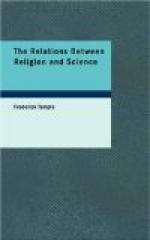The evidence for the uniformity of nature consists in the fact that from the beginning of Science the known reign of physical law has been steadily extending without a check; that instance after instance of apparent exception has been brought by further examination within its province; that the hypothesis of uniformity has now been long on trial and has never yet been found to fail; that no one who has so tried it has the slightest hesitation in trusting it for the future, as he has proved it in the past. But clearly as this evidence proves a general, it never gets beyond a general, uniformity. It has not succeeded in showing that the human will comes under the same rule. It has not succeeded in silencing the voice within us, which claims superiority for the moral over the physical. And when the utmost extent of human knowledge is compared with the vastness of nature, the claim to extend the induction from generality to universality is seen to be utterly untenable. So much as this, indeed, Science has rendered highly probable, that the uniformity of nature is never broken except for a moral purpose. It is only for such a purpose that the will is ever free. It is only for such a purpose that Revelation has ever claimed to be superior to nature. But beyond this Science cannot go. Let it be granted that the claim for freedom of the will has been often unduly pushed far beyond this limit, and let it be granted that religions professing to be revelations have included records of miracles which had no moral purpose. This does not affect the general conclusion that the evidence for uniformity has never succeeded, and can never succeed in showing, that the God who made and rules the universe never sets aside a physical law for a moral purpose, either by working through the human will or by direct action on external nature.
Science will continue its progress, and as the thoughts of men become clearer it will be perpetually more plainly seen that nothing in Revelation really interferes with that progress. It will be seen that devout believers can observe, can cross-question nature, can look for uniformity and find it, with as keen an eye, with as active an imagination, with as sure a reasoning, as those who deny entirely all possibility of miracles and reject all Revelation on that account. The belief that God can work miracles and has worked them, has never yet obstructed the path of a single student of Science; nor has any student who repudiated that belief found any aid in his study from that repudiation. The rush of Science of late years has for the time made many men fancy that Science is everything; and believers in Revelation have helped this fancy by insisting on their part that Revelation is everything; but such waves of opinion, resting really on feeling, are sure to pass away, and scientific men will learn that there are other kinds of knowledge besides scientific knowledge, as believers are already learning that God teaches us by other methods besides the method




